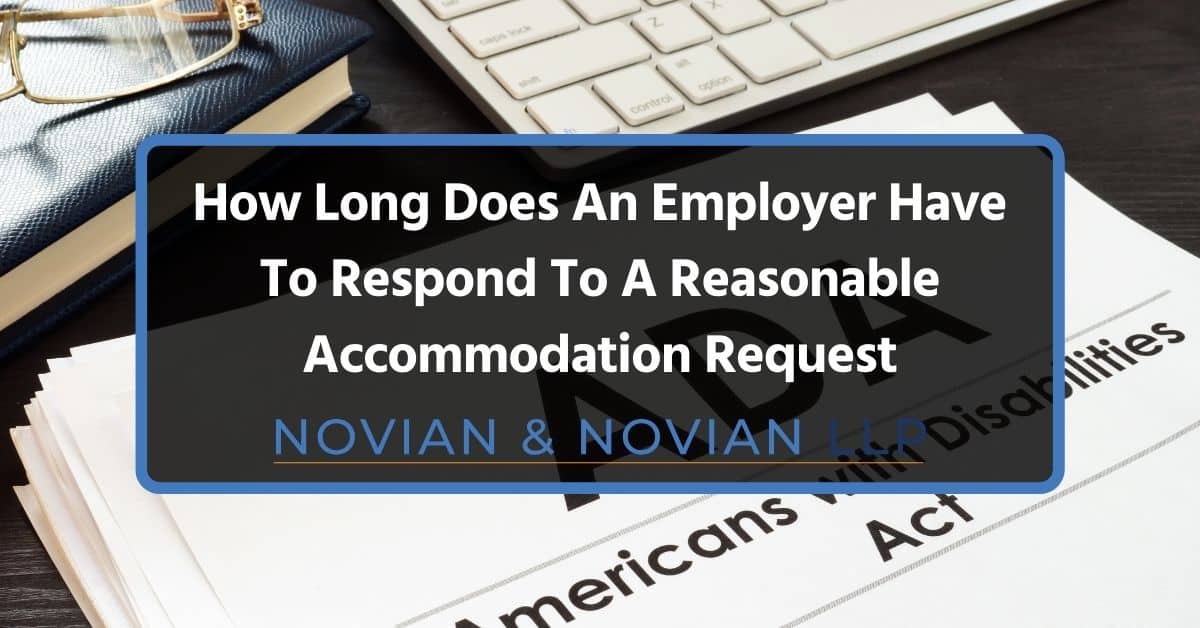
by Farhad Novian | February 18th, 2025 | Employment Law
Disclaimer: This blog provides general information about reasonable accommodation requests as it applies to employers and employees. Employers should consult with legal counsel like Novian & Novian to ensure compliance with applicable laws and regulations.
In accordance with the Americans with Disabilities Act (ADA) and other relevant legislation, employers must provide their employees with reasonable accommodations. That said, an employer is not required to provide a particular accommodation if it would cause undue hardship, defined as significant difficulty or expense, considering factors such as the organization’s size, financial resources, and the nature of the operation.
However, the timeframe within which an employer is required to respond to a reasonable accommodation request remains ambiguous. The Americans with Disabilities Act (ADA) does not set a specific deadline for an employer to respond to a reasonable accommodation request. However, the Equal Employment Opportunity Commission (EEOC) states that an employer must respond in a timely and reasonable manner without unnecessary delays.
At Novian & Novian, we have over 35 years of experience in guiding employers in employment law. Our experts mean to be are here to help you manage reasonable accommodation requests. Our goal is to ensure compliance with the ADA and assist you with any discrimination lawsuits. Contact us now to get started!
The purpose of this article is to equip employers with the knowledge and tools necessary to manage reasonable accommodation requests effectively. It helps in enhancing workplace productivity!
What Is a Reasonable Accommodation Request?
A reasonable accommodation refers to modifications or adjustments that can be made to a job function or work environment to enable a qualified person with a disability to apply for a job and perform the role efficiently. These changes could include altering the physical layout of a workspace, offering interpreters or readers, modifying work schedules, etc. Moreover, the goal of reasonable accommodations is to provide equity, not advantage.
Responding promptly and effectively to accommodation requests is not just a legal obligation; it’s a critical component of an inclusive workplace culture. Reasonable accommodations are adjustments or modifications provided by an employer to enable employees with disabilities to perform the essential job functions of their position. These accommodations can range from making physical changes to the work environment, providing specialized equipment, and modifying work schedules to job restructuring.
The legal foundation for reasonable accommodations in the U.S. is the Americans with Disabilities Act (ADA). It was enacted to prevent discrimination against individuals with disabilities in all areas of public life, including jobs, schools, transportation, and all public and private places that are open to the general public. The ADA requires an employer to provide reasonable accommodations to any qualified individual with disabilities unless doing so would cause undue hardship, significant difficulty, or expense for the employer. The ADA applies to employers with 15 or more employees, including state and local governments.
Employer Deadline for Reasonable Accommodation Requests
The ADA requires employers to provide reasonable accommodations to qualified employees with disabilities unless doing so would cause undue hardship to the business. This involves considering the cost of the accommodation, the employer’s financial resources, the impact on the business’s operation, and the essential functions of the job.
The law is designed to ensure that individuals with disabilities can enjoy equal employment opportunities. While the ADA mandates these accommodations, it does not provide a strict timeline for the response process; it only states that the response should not be unduly delayed.
Responding timely to accommodation requests is critical not only for legal compliance but also for supporting employees effectively. Delays can hinder an employee’s ability to perform their job and contribute to a sense of exclusion or discrimination.
Furthermore, failure to respond promptly can lead to legal repercussions, including discrimination lawsuits. The Equal Employment Opportunity Commission (EEOC) emphasizes the importance of engaging in an expedited interactive process to determine and implement appropriate accommodations.
The nature of the accommodation request can greatly influence the response time. Simple adjustments may be implemented quickly, while complex accommodations requiring significant changes or external equipment might take longer. The need for medical or professional input can also extend the timeframe, as an employer may require documentation to understand the disability and the need for accommodation.
To streamline the response process, it is important for any employer to establish a clear policy that outlines the process for employees to follow in filing accommodation requests. Furthermore, the organization should appoint a reasonable accommodation coordinator to manage requests and the interactive process.
It is important to ensure that managers and supervisors are trained to recognize requests and how to proceed. Most importantly, transparent communication with the employee throughout the process is needed to manage expectations and provide updates.
How Long Does An Employer Have To Accommodate A Disability?
Under the Americans with Disabilities Act (ADA), an employer is required to provide reasonable accommodation for a qualified employee with a disability as long as it does not create an undue hardship on the business. However, there is no specific time limit for how long an employer must provide the accommodation. The duration depends on factors such as how long the employee needs it, changes in job role or workplace, undue hardship exception, and medical reassessment.
Often, employers are confused about situations where it is necessary to stop providing accommodation. As the employer, you can stop providing accommodation if the employee no longer needs it or if it causes undue hardship (significant difficulty or expense). You can also stop providing accommodation if the employee cannot perform essential job functions even with accommodation. Similarly, you can stop if the employee poses a direct threat to health or safety that cannot be mitigated.
The ADA Interactive Process: Employer and Employee Responsibilities
The interactive process is a crucial mechanism under the Americans with Disabilities Act (ADA). It is designed to facilitate effective communication between employers and employees to identify and implement reasonable accommodations for individuals with disabilities. The interactive process is necessary because it helps both parties—employer and employee—understand the limitations arising from the disability and explore potential accommodations that can enable the employee to fulfill their job duties effectively.
An accommodation request can be made by the employee, a family member, or another representative. Keep in mind that it does not have to be a written request, as verbal requests should also trigger the process.
As an employer, the interactive process also involves gathering information about the employee. This may involve requesting medical conditions, medical information proof, or documentation, within the bounds of the ADA and with the employee’s consent.
It is also your responsibility to clearly define what tasks are essential to the job. This understanding is crucial for determining reasonable accommodations without imposing hardship on the business. Then, engage in a dialogue with the employee to discuss potential accommodations. Consider various alternatives and assess their feasibility, including job restructuring, modified work schedules, assistive technologies, or even reassignment to a vacant position as a last resort.
The next step is to decide on an accommodation that enables the employee to perform their job functions effectively. Ensure that the chosen accommodation does not cause undue stress for the business.
It is also important to maintain detailed records of the interactive process, including the initial request, discussions, considered accommodations, and the rationale for the final decision. This documentation is crucial for compliance and can be valuable in the event of any disputes. Furthermore, be open to revisiting the accommodation and making necessary adjustments over time if the need arises.
It is best to approach the interactive process with a sense of respect and cooperation. Remember, the goal is to find a mutually agreeable solution that supports the employee’s needs and the organization’s operations.
Can a Reasonable Accommodation Request Be Denied?
Yes, a reasonable accommodation request can be denied under certain circumstances defined by the Americans with Disabilities Act (ADA) and related laws. An employer can deny a request if it would cause significant difficulty or expense, considering factors like the organization’s size, financial resources, and the impact on operations.
Furthermore, if the accommodation is for modifications or adjustments that are not related to the essential job functions, the employer may deny the request. Accommodation can also be denied if it poses a direct threat to the health or safety of others in the workplace and the threat cannot be mitigated or eliminated by reasonable accommodation.
An employer can deny a request if the individual does not have a disability recognized by the ADA. If the proposed accommodation would not enable the employee to perform the essential functions of the job, the employer can seek alternative accommodations or deny the request.
While carrying out your job and responsibilities as an employer, remember that employees also have rights. Employees have the right to be informed about the reason for denial and engage in the interactive process to seek alternative accommodations. They can also receive the denial in writing, including for the decision. If they are not satisfied, they can appeal the decision through internal processes or file a complaint with the Equal Employment Opportunity Commission (EEOC) or similar regulatory bodies.
If the requesting employee does not comply with the required processes for requesting an accommodation, or if they refuse a reasonable alternative accommodation offered by the employer, the employer may not be required to provide the original accommodation requested. It’s why it is necessary for both parties to actively participate in the interactive process.
Dispute Resolution With Novain & Novian
Employers play a critical role in creating an inclusive and supportive workplace by effectively accommodating employees with disabilities. The Americans with Disabilities Act (ADA) outlines the necessity for employers to provide reasonable accommodations, emphasizing the importance of meeting legal timelines and engaging in an interactive process with employees. To support an inclusive workplace culture, employers should regularly review and improve their accommodation policies.
If you’re seeking expert guidance on navigating the complexities of accommodation requests, dispute resolution, or enhancing your workplace policies, Novian & Novian is here to assist. Our team of experienced professionals can provide tailored advice and support to ensure your organization not only complies with legal requirements but also promotes a truly inclusive and supportive work environment.
Contact Novian & Novian today to explore how we can help you!
FAQS
What Is the Employer’s Responsibility to Accommodate a Disability?
Employers covered under the Americans with Disabilities Act (ADA) are required to provide reasonable accommodations to qualified employees with disabilities unless doing so would cause an undue hardship to the business. This means that employers must engage in an interactive process with employees to understand their needs and explore possible accommodations that enable them to perform essential job functions.
What Constitutes an Undue Delay?
There is no specific deadline under the ADA for responding to an accommodation request, but employers must act in a timely manner. An undue delay occurs when an employer takes an unreasonably long time to process a request without valid justification.
What Are the Best Practices for Employers to Stay Compliant?
To remain compliant with the ADA and avoid potential legal issues, employers should establish a clear and structured process for handling accommodation requests. It is essential to respond to requests promptly and maintain open communication with employees throughout the process.
Contact Us
Have questions about this post? Novian & Novian is a full service law firm in Los Angeles with clients that span the country. Contact us today for a free consultation.
Contact Us
Have questions about this post? Novian & Novian is a full service law firm in Los Angeles with clients that span the country. Contact us today for a free consultation.



